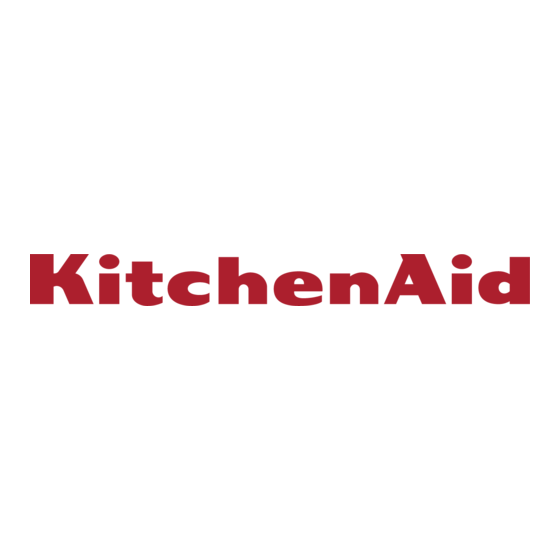KitchenAid YKEHC309 Manuel d'utilisation et d'entretien - Page 9
Parcourez en ligne ou téléchargez le pdf Manuel d'utilisation et d'entretien pour {nom_de_la_catégorie} KitchenAid YKEHC309. KitchenAid YKEHC309 20 pages. Built-in electric convection oven
Également pour KitchenAid YKEHC309 : Manuel d'utilisation et d'entretien (20 pages), Manuel d'utilisation et d'entretien (20 pages)

Bakeware
The bakeware material affects cooking results. Follow
manufacturer's recommendations and use the bakeware size
recommended in the recipe. Use the following chart as a guide.
BAKEWARE/
RESULTS
Light colored
Use temperature and time
aluminum
recommended in recipe.
Light golden
crusts
Even browning
Dark aluminum
May reduce baking temperatures
and other
25°F (15°C).
bakeware with
Use suggested baking time.
dark, dull and/or
non-stick finish
For pies, breads and casseroles, use
temperature recommended in
Brown, crisp
recipe.
crusts
Place rack in center of oven.
Insulated cookie
Place in the bottom third of oven.
sheets or baking
May need to increase baking time.
pans
Little or no
bottom
browning
Stainless steel
May need to increase baking time.
Light, golden
crusts
Uneven
browning
Stoneware
Follow manufacturer's instructions.
Crisp crusts
Ovenproof
May reduce baking temperatures
glassware,
25°F (15°C).
ceramic glass or
ceramic
Brown, crisp
crusts
Meat Thermometer
On models without a temperature probe, always rely on a meat
thermometer to determine doneness of meat and poultry. The
internal temperature, not appearance, is what counts. A meat
thermometer is not supplied with this appliance.
Insert the thermometer into the center of the thickest portion
of the meat or inner thigh or breast of poultry. The tip of the
thermometer should not touch fat, bone or gristle.
After reading the thermometer once, push it into the meat ¹⁄₂
in. (2 cm) more and read again. If the temperature drops,
cook the meat or poultry longer.
Check pork and poultry in two or three places.
RECOMMENDATIONS
Oven Vent
1
2
3
1. Upper oven
2. Oven vent
3. Lower oven
The oven vent should not be blocked or covered since it allows
the release of hot air and moisture from the oven. Doing so will
cause poor air circulation, affecting cooking and cleaning results.
Never set plastics, paper or other items that could melt or burn
near the oven vent.
Baking and Roasting
1. Broil elements
2. Bake element (hidden in floor panel)
During baking or roasting, the bake and broil elements will cycle
on and off in intervals to maintain the oven temperature.
If the lower oven door is opened during baking or roasting, the
broil elements will turn off immediately and the bake element will
turn off in 2 minutes. They will come back on once the door is
closed.
To Bake or Roast:
Before baking and roasting, position the racks according to the
"Positioning Racks and Bakeware" section. When roasting, it is
not necessary to wait for the oven to preheat before putting food
in, unless recommended in the recipe.
1. Press BAKE (optional).
Press the number pads to enter a temperature other than
350°F (177°C). The bake range can be set between 170°F
and 500°F (77°C and 260°C).
2. Press START.
"Lo°" will appear on the lower oven display if the actual oven
temperature is under 170°F (77°C).
When the actual oven temperature reaches 170°F (77°C), the
lower oven display will show the temperature increasing in 5°
increments.
When the set temperature is reached and the oven is
preheated, if enabled, one tone will sound.
3. Press LOWER OVEN CANCEL when finished cooking.
1
2
9
